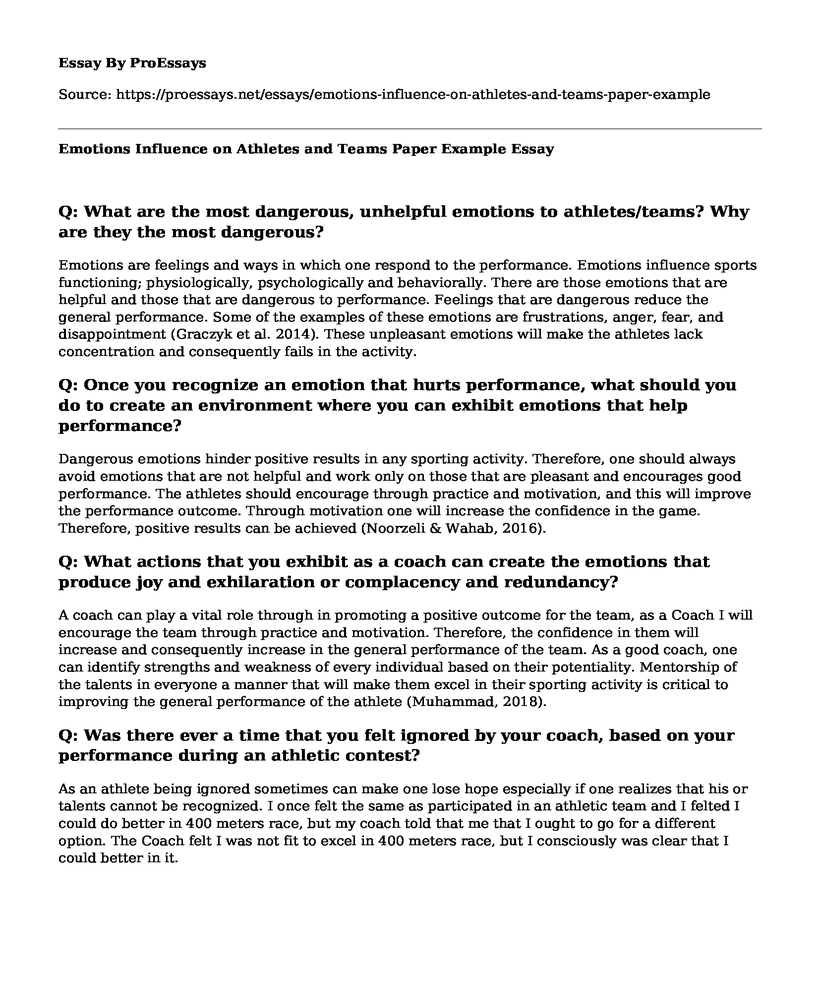Q: What are the most dangerous, unhelpful emotions to athletes/teams? Why are they the most dangerous?
Emotions are feelings and ways in which one respond to the performance. Emotions influence sports functioning; physiologically, psychologically and behaviorally. There are those emotions that are helpful and those that are dangerous to performance. Feelings that are dangerous reduce the general performance. Some of the examples of these emotions are frustrations, anger, fear, and disappointment (Graczyk et al. 2014). These unpleasant emotions will make the athletes lack concentration and consequently fails in the activity.
Q: Once you recognize an emotion that hurts performance, what should you do to create an environment where you can exhibit emotions that help performance?
Dangerous emotions hinder positive results in any sporting activity. Therefore, one should always avoid emotions that are not helpful and work only on those that are pleasant and encourages good performance. The athletes should encourage through practice and motivation, and this will improve the performance outcome. Through motivation one will increase the confidence in the game. Therefore, positive results can be achieved (Noorzeli & Wahab, 2016).
Q: What actions that you exhibit as a coach can create the emotions that produce joy and exhilaration or complacency and redundancy?
A coach can play a vital role through in promoting a positive outcome for the team, as a Coach I will encourage the team through practice and motivation. Therefore, the confidence in them will increase and consequently increase in the general performance of the team. As a good coach, one can identify strengths and weakness of every individual based on their potentiality. Mentorship of the talents in everyone a manner that will make them excel in their sporting activity is critical to improving the general performance of the athlete (Muhammad, 2018).
Q: Was there ever a time that you felt ignored by your coach, based on your performance during an athletic contest?
As an athlete being ignored sometimes can make one lose hope especially if one realizes that his or talents cannot be recognized. I once felt the same as participated in an athletic team and I felted I could do better in 400 meters race, but my coach told that me that I ought to go for a different option. The Coach felt I was not fit to excel in 400 meters race, but I consciously was clear that I could better in it.
References
Graczyk, M., Pachalska, M., Ziolkowski, A., Manko, G., Lukaszewska, B., Kochanowicz, K., ... & Kropotow, I. D. (2014). Neurofeedback training for peak performance. Annals of Agricultural and Environmental Medicine, 21(4).
Muhammad, D. (2018). Janieve Russell (JAM). Sage, 19, 09.
Noorzeli, N. M., & Wahab, M. N. A. (2016). A Study of the Usage of Biofeedback Techniques to Improve Self Performance and HRV Profile among Ikhtiar Malaysia Entrepreneurs. Malaysian Journal of Social Sciences and Humanities (MJSSH), 1(3), 1-13.
Cite this page
Emotions Influence on Athletes and Teams Paper Example. (2022, Jun 06). Retrieved from https://proessays.net/essays/emotions-influence-on-athletes-and-teams-paper-example
If you are the original author of this essay and no longer wish to have it published on the ProEssays website, please click below to request its removal:
- Cultural Relevance of Mental Health Patient Navigators for Ethnic Minority Groups
- Music Therapy and Effects of Music on Psychological and Mental Health
- Essay Example on Development: Constancy & Change Across Life
- Essay Example on Jane: A Life of Love and Loss
- Annotated Bibliography: Organizational Culture, Burnout, Bullying, and Nurse Turnover Intention
- Essay Example on Max Weber's Theory of Class: Ownership & Social Divisions
- Annotated Bibloography Example: Comparative Analysis of Juvenile Justice and Mood Disorders







